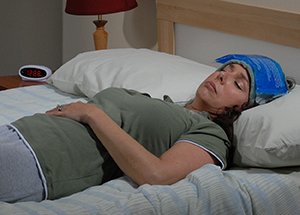Migraine headache: Stages and treatment
A migraine headache tends to progress in stages. Learning these stages can help you better understand what is happening. Then you can learn ways to reduce pain and relieve other symptoms. Methods for easing your symptoms include self-care and medicines.
Migraine stages
Migraines tend to progress through 4 stages. Many people don't have all stages, and stages may differ with each headache:
-
Prodrome. A few hours to 1 day or so before the headache, you may feel tired (yawning many times), uneasy, or moody. You may also feel bloated or crave certain foods.
-
Aura. Up to 1 hour before the headache starts, some migraine sufferers experience aura—flashing lights, blind spots, other vision problems, confusion, trouble speaking, or other neurologic symptoms.
-
Headache. Moderate to severe pain affects 1 side of the head and then can spread to both sides, often along with upset stomach (nausea). You may be highly sensitive to light, sound, and odors. Vomiting or diarrhea may also happen. This stage lasts 4 to 72 hours.
-
Postdrome. After your headache ends, you may feel tired, achy, and washed out. This may last for a day or so.
Self-care during a migraine

Here is what you can do:
-
Use a cold compress. Wrap a thin cloth around a cold pack, a cold can of soda, or a bag of frozen vegetables. Apply this to your temple or other pain site.
-
Drink fluids. If nausea makes it hard to drink, try sucking on ice.
-
Rest. If possible, lie down. Try not to bend over, as this may increase your pain. Sometimes laying in a dark quiet room can help the migraine from being aggravated.
-
Try caffeine. Some people find that drinking fluids with caffeine, such as coffee or tea, helps to lessen migraine pain. But too much caffeine can trigger migraines in some people.
Using medicines
Work with your healthcare provider to find the right medicines for you. Medicines for migraine may ease pain (analgesics), relieve nausea, or attack the migraine's root causes (migraine-specific medicines).
Rebound headache
Taking pain medicine each day, or even several times a week, may lead to more frequent and severe headaches. These are called rebound headaches. If you think you're having rebound headaches, tell your healthcare provider. They can help you safely decrease your medicine. Rebound caffeine withdrawal headaches can also happen. Certain medicines are addictive. They can cause rebound headaches when stopped abruptly.
Online Medical Reviewer:
Anne Fetterman RN BSN
Online Medical Reviewer:
Heather M Trevino BSN RNC
Online Medical Reviewer:
Mahammad Juber MD
Date Last Reviewed:
10/1/2024
© 2000-2024 The StayWell Company, LLC. All rights reserved. This information is not intended as a substitute for professional medical care. Always follow your healthcare professional's instructions.